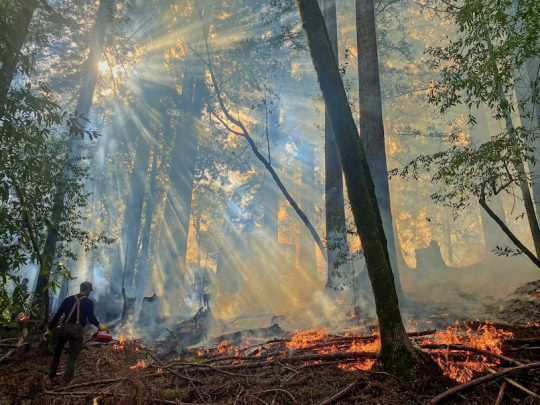Is Fire the Right Tool for Your Job? Good Fire Series 2024, Part I

Online
Thu, Mar 28, 10:00 am
– 11:30 am
Admission Fees:
none
Registration Links:
Register for this event
Prescribed, or controlled, burning has been a primary tool for land management since nearly the beginning of time. Increased efforts at fire suppression in the 19th and 20th centuries eroded the popularity of the practice. Come explore with us whether fire might be the right tool for your land management job. Watch recorded event here: Is Fire the Right Tool for Your Job? Good Fire Series 2024, Part I
This is Part I of a three-part series, the "Good Fire Series 2024," presented by Sonoma State University’s Center for Environmental Inquiry and funded by a grant from the Mendocino County Fire Safe Council. See details below to register for subsequent events.
Presenters
- Sasha Berleman, Director of Fire Forward, a project of Marin County's Audubon Canyon Ranch that trains and supports community members to be self-sufficient in prescribed burning on their properties
- Andres Avila, Fire Chief of the Anderson Valley Fire Department with years of experience in prescribed burning in Mendocino County
Details
Controlled burning has deep historical roots in many regions of the United States, where the practice was quickly adopted from the native peoples by early European settlers. It became used widely, primarily to improve forage conditions for free-ranging cattle and to improve visibility and access for hunters. The US Forest Service’s Smokey the Bear Wildfire Prevention campaign launched in 1944 heightened concerns about using fire as an effective tool itself to mitigate the risks of catastrophic wildfires.
But in recent decades, the planned and well-executed broadcast application of fire to a landscape has been recognized as valuable in: controlling the spread of invasive species such as Douglas fir trees in an oak woodlands, or non-native grasses in grazing lands; or preventing runaway wildfires by creating fuel breaks to interrupt the spread of the fire or reducing the fuel available to burn; or serving to preserve and conserve ecological characteristics as food sources or for cultural uses such as basketry.
In this interactive virtual session, designed for landowners and managers, you will learn from experts about the impact of fire on a landscape. We will look at videos of a variety of landscapes and learn from these experts how to read those landscapes, assessing whether fire might be able to improve safety, or the health of native species. When you leave this workshop, you will be able to see evidence of historic fire and evidence of lack of fire. You will be able to make predictions of about whether fire might improve safety, reduce wildland diseases, or improve habitat for native species.
This is Part I of a three-part series, the "Good Fire Series 2024," presented by Sonoma State University’s Center for Environmental Inquiry and funded by a grant from the Mendocino County Fire Safe Council.
- Part II, How to Prepare Your Land for Good Fire, will be held on April 13 from 10:00 – 2:00 pm at the Galbreath Wildlands Preserve in Yorkville, Mendocino County. Registration is limited. Go to cei.sonoma.edu/Rx-burn-2 for more information and to register.
- Part III, Rx Burn Permits and Process, will be April 29 on Zoom from 5:30 – 7:00. Go to cei.sonoma.edu/Rx-burn-3 for more information and to register.
Logistics
No previous experience or knowledge is required. This event is recommended for ages 16 and up. Zoom meeting details will be sent to you upon registration.
How to Sign Up
Register at the link below. Each participant should register separately. Registration is free.
About the Center
Sonoma State University’s Center for Environmental Inquiry empowers university students to work with community members on the environmental challenges of the North Bay. Our mission is to create an engaged and environmentally ready society, one where all people have the skills to find solutions to the challenges facing our earth. SSU Preserves are open to everyone engaged in education or research. Reservations are required.

